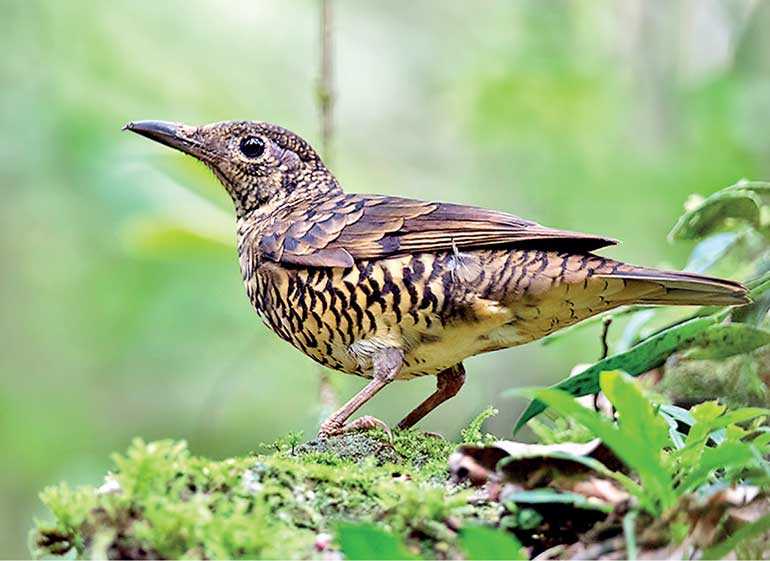Saturday Feb 21, 2026
Saturday Feb 21, 2026
Wednesday, 12 August 2020 00:00 - - {{hitsCtrl.values.hits}}

Sri Lanka Thrush, copyright Sam Woods, from the surfbirds galleries
www.surfbirds.com: During the early days of bird-watching in Sri Lanka, the attitude of travel organisers and hoteliers towards birdwatchers was generally a negative one. Birders are not like ‘normal’ tourists. With their cameras, binoculars, tripods and spotting scopes, they look different, dress differently and often behave differently, such as getting up in the small hours of the day and foregoing meals.
Traditional hospitality providers often saw birdwatchers as disorderly, disruptive, and negatively impacting their businesses. Birders were also seen as not contributing to the local economy, considered to be obsessed only with bird-watching and uninterested in paying for locally produced items and other experiences.
The Field Ornithology Group of Sri Lanka (FOGSL) decided to interact with the tourism sector – hotels and tour operators – to address these perceptions and to draw the industry into the world of birds. FOGSL also realised that the development of eco-tourism, and rise in tourism numbers generally, meant that the travel industry was uniquely positioned to promote and drive home the conservation message. Equally, if left unchecked, unsustainable tourism can be a threat to biodiversity. All this prompted us to start the Bird Friendly Program in 1997.
FOGSL first developed a philosophy for the program, based on the fact that the biodiversity of a country is the sovereign asset of that country, and its citizens are obligated to conserve and use it sustainably. Nature tourism is an avenue to make use of this asset wisely, without exploiting it or harming it. And besides enjoying the fruits of nature, another driving force for nature tourists can be the opportunity to contribute towards its conservation. Accordingly, demonstrating the potential benefits of birdwatchers to the tourism industry was, and continues to be, vital.
With this in mind, FOGSL began to engage with the hospitality sector through a system of staff workshops and certification. The training includes topics such as responsible, bird-friendly tourism; biodiversity and conservation; bird identification; and birding techniques. FOGSL does not provide its services on a monetary basis, but aims to develop strong relationships with hotels and tour operators to secure their long-term commitment – especially at senior management level – to conservation in Sri Lanka.
The program has proven successful. Participating hotels and tour operators have introduced responsible, sustainable and environmentally-friendly practices into their operations. The program has also contributed positively to staff attitudes towards both clients and management.
The benefits are being recognized by the management staff, and the program emphasises participation by senior management alongside staff, because FOGSL believes that such initiatives will only be successful and sustainable if there is senior management buy-in. One hotel chain had its Chairman and shareholders joining staff on the program – a first for the hotel. Another establishment brought in substitute staff from other hotels to manage theirs whilst the entire team took part in the program: compelling examples demonstrating the degree of commitment the program has managed to engender from participating hotels.
Through the program, one hotel completed an inventory of all trees on its premises, established butterfly gardens and organic vegetable farms, and renamed all the rooms with bird names. Some hotels have initiated nature tours run by resident nature guides within the hotels, and some hotels and travel agents certified under the program brand themselves as ‘bird friendly’.
Another output of the program has been a definition for bird tourism, along with principles for bird tourism (below) which were subsequently adopted by the Asia Partnership.
Principles of bird tourism
The hotel industry, unfortunately, is one with high staff turnover. Despite this, we are pleased that the participating hotels and tour operators continue to advance the principles underpinning the Bird Friendly program.
(Source: http://www.surfbirds.com/community-blogs/blog/2020/08/09/making-the-hotels-of-sri-lanka-birdwatcher-friendly/)